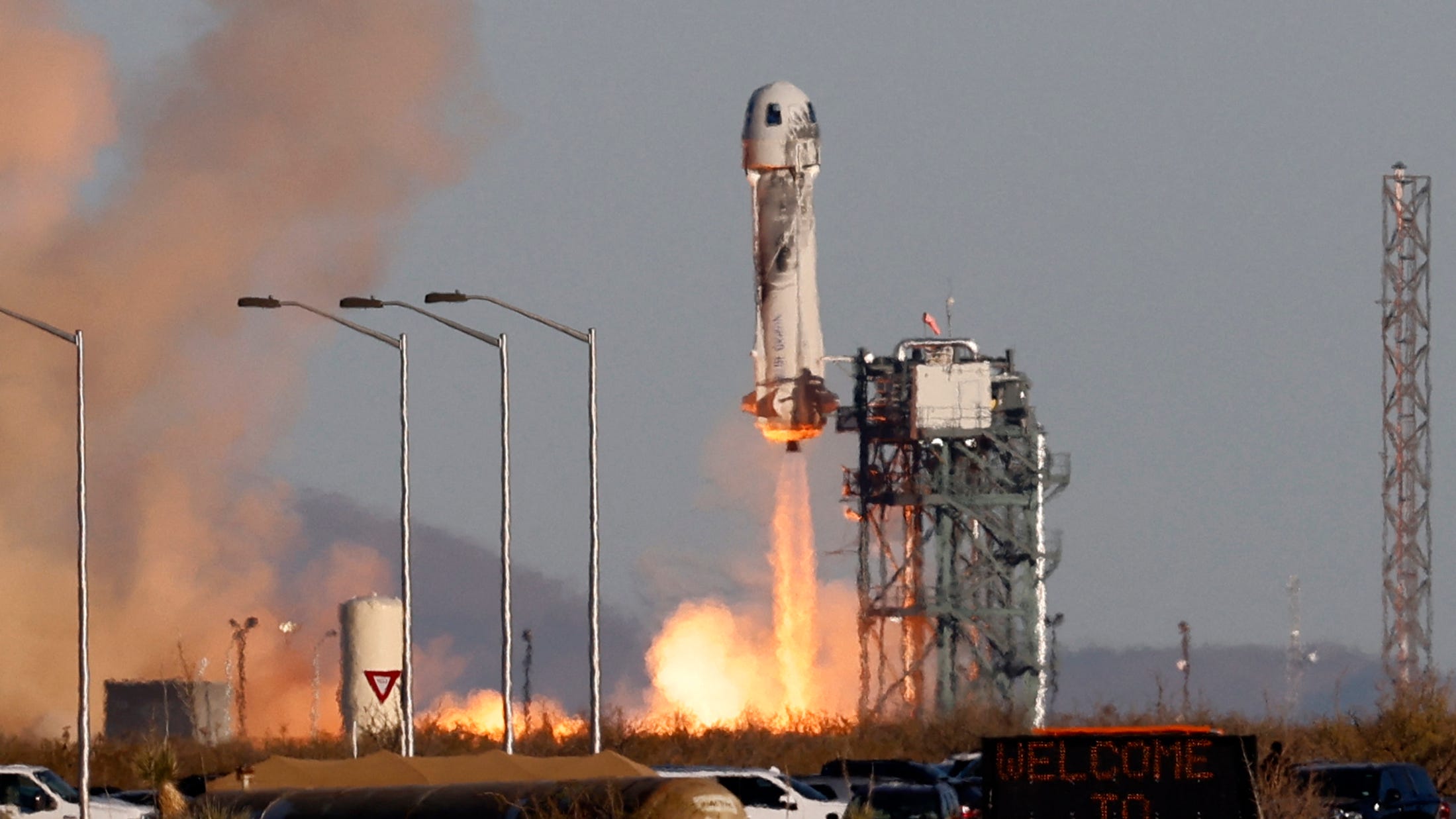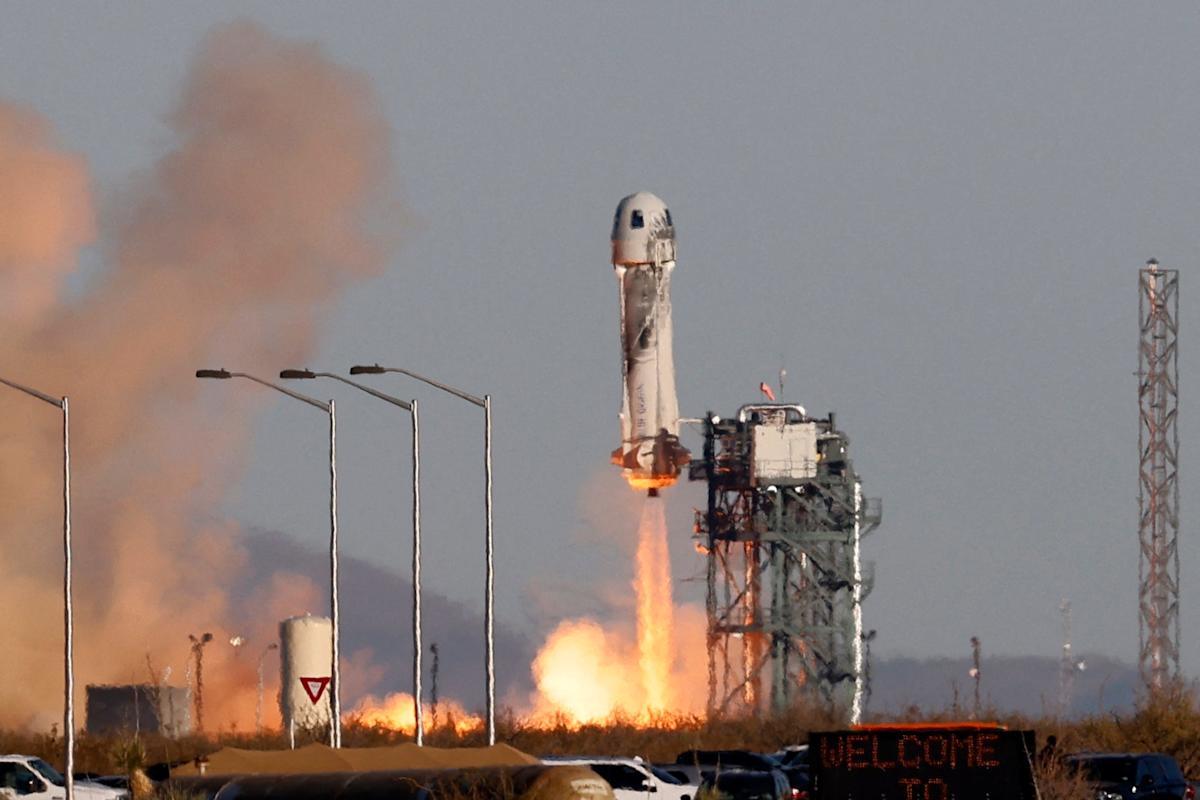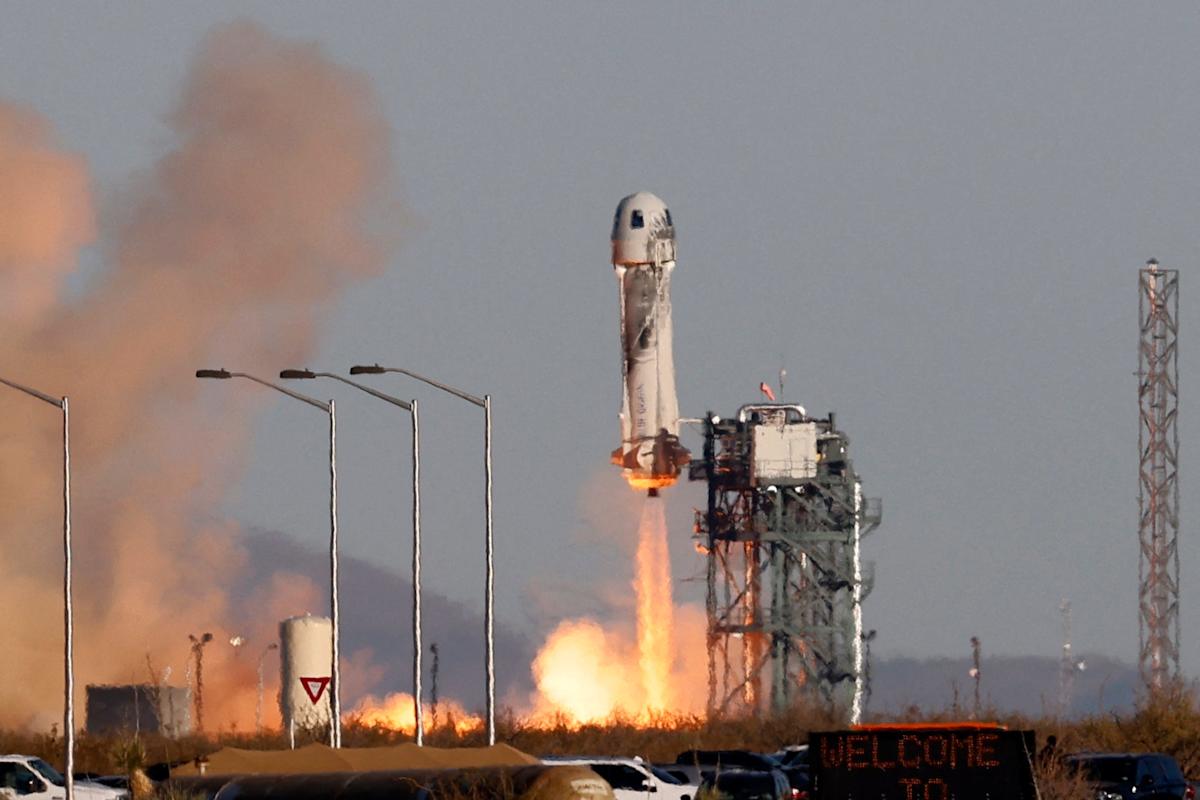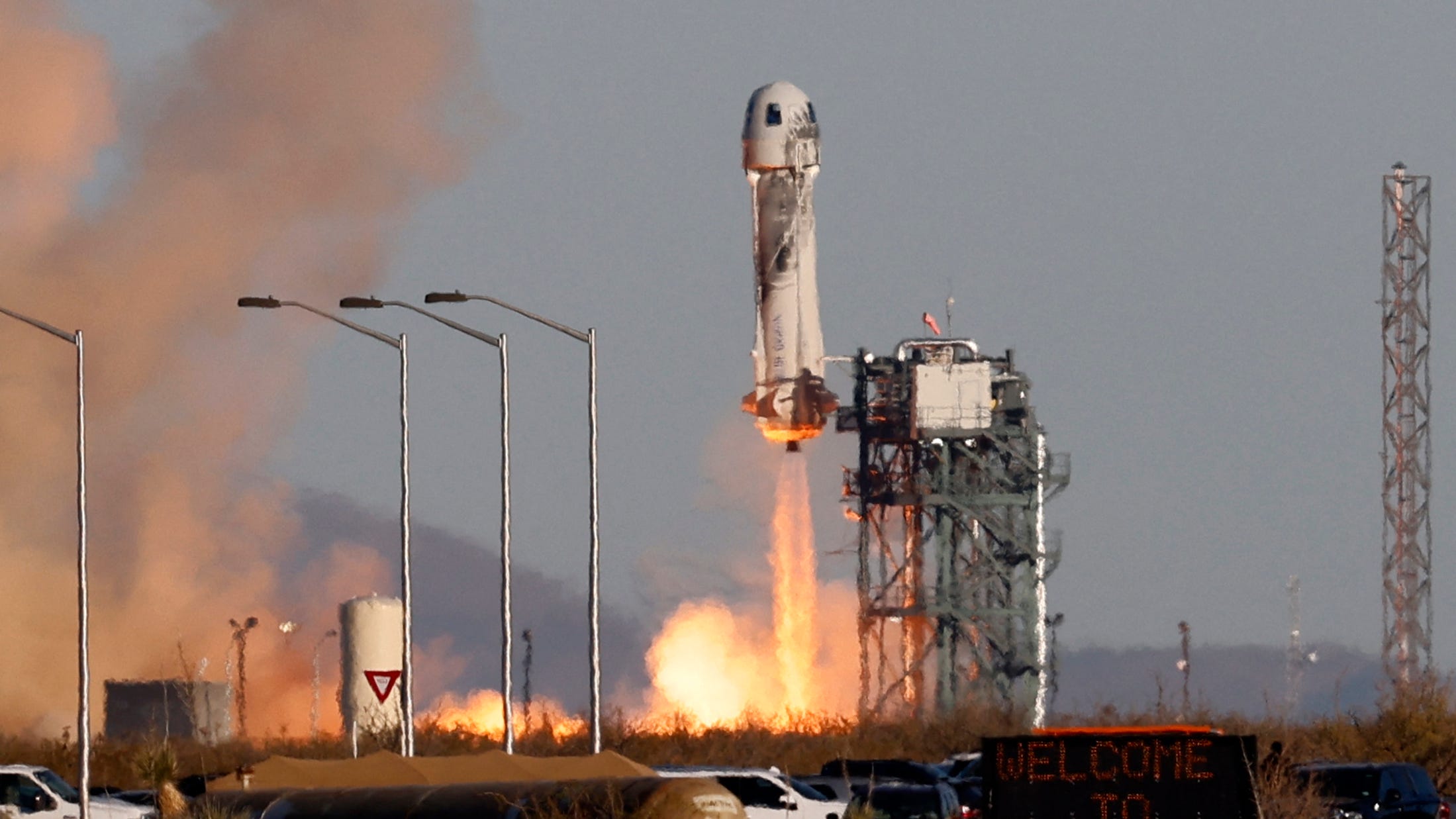Get Ready for Lift-Off: Katy Perry and Gayle King are Breaking Space Records, Joining an Elite Crew of Celebrities Who Have Already Blazed a Trail in the Cosmos

Historic All-Female Space Flight

Show Caption Hide Caption Gayle King, Katy Perry head to space in historic flight Blue Origin’s “New Shepard” space vehicle will historically carry an all-female crew, including Katy Perry and Gayle King, to space.
A group of six women that includes CBS host Gayle King and pop star Katy Perry are preparing to blast off on a historic all-female commercial spaceflight in one week. When a Blue Origin spacecraft gets off the ground, the crew of women will become the latest humans to be treated to a brief trip to the edge of space courtesy of Amazon founder Jeff Bezos’ space technology company.
Blue Origin, which Bezos started in 2000, has been offering the cosmic joyrides to celebrities and other paying customers since its New Shepard spacecraft began crewed launches in 2021. The launch, scheduled for Monday in West Texas, will be the company’s 11th human flight and 31st flight overall.

The Crew
The six women are part of a commercial spaceflight mission known as NS-31. Here’s a look at who will be aboard New Shepard, composed of a rocket and passenger capsule:
- Aisha Bowe, a former NASA rocket scientist, entrepreneur and global STEM advocate
- Amanda Nguyen, a bioastronautics research scientist
- Gayle King, a journalist, co-host of “CBS Mornings,” editor-at-large of Oprah Daily, and the host of Gayle King in the House on SiriusXM radio
- Katy Perry, one of the bestselling music artists of all time and a former host of “American Idol”
- Kerianne Flynn, who has spent the past decade focused on nonprofit work and film production
- Lauren Sánchez, an Emmy Award-winning journalist, New York Times bestseller, and fiancée of Amazon founder Jeff Bezos
What Happens during the Blue Origin Spaceflight?

Named after astronaut Alan Shepard, the first American in space, New Shepard can hold up to six passengers for a brief voyage above the Kármán Line – the 62-mile-high internationally recognized boundary of space.
With the vehicle’s latest crewed flight Feb. 25, 10 of Blue Origin’s 30 missions have now carried 52 people to the edge of space. Bezos himself joined the spacecraft’s first crewed flight in 2021 as part of the NS-16 mission, which came after New Shepard flew on 15 test flights beginning in 2012.
Each spaceflight lasts about 11 minutes from liftoff to capsule touchdown, allowing up to six people to experience a few minutes of weightlessness and get a view of Earth’s curvature.

What is the Cost of a Blue Origin Flight?
Though Blue Origin does not publicly list prices on its website, a form to reserve a seat requires customers to agree to a $150,000 deposit alone.
What to Know about Blue Origin’s Spacecraft
Blue Origin says its next spaceflight is set to make history. With celebrities such as Katy Perry, Lauren Sánchez and Gayle King on board, the all-woman crew will fly into space when the New Shepard spacecraft launches from the West Texas desert this spring.
The company says it’s the first all-woman flight since the Soviet Union’s Valentina Tereshkova’s solo spaceflight in 1963.

Olivia Munn Calls New Blue Origin Space Flight with Katy Perry, Lauren Sánchez ‘Gluttonous’
As Blue Origin readies for its first all-female flight to space, not everyone is anxiously awaiting takeoff. Olivia Munn sounded off on the mission in a Thursday appearance on “Today with Jenna & Friends,” calling the flight − which will bring celebrities like Katy Perry and Gayle King to space − “gluttonous.”
“What are they doing?” the actress said. “Like why?” “I’m just saying this, I know this is probably not the cool thing to say but like there are so many other things that are so important in the world right now.”
Pointing out that only one of the six-person crew is an actual astronaut, Munn expressed exasperation at the whole ordeal.
“So you’re on like Magic Mountain,” she quipped when host Jenna Bush Hager revealed the women would only be in space for about 11 minutes.
“It’s so much money to go to space,” Munn added, later pointing out that all the rocket fuel can’t be good for the planet.
“There’s a lot of people who can’t even afford eggs … I think it’s a bit gluttonous.”
What to Expect: An Inside Look at the 11-Minute Journey
Unionjournalism has detailed information on the upcoming Blue Origin flight carrying an all-female crew, including Katy Perry and Gayle King, into space. The mission, known as NS-31, will take off from Launch Site One in West Texas and is scheduled for launch on Monday. The flight, which lasts approximately 11 minutes from liftoff to capsule touchdown, offers passengers a unique experience of weightlessness and breathtaking views of Earth’s curvature.
The fully autonomous New Shepard vehicle, which includes a rocket and passenger capsule, will carry the crew to the internationally recognized boundary of space, the Kármán line, at 62 miles above the Earth. During the 11-minute journey, the capsule will detach from the rocket, allowing the passengers to experience a few minutes of weightlessness. The capsule re-enters the atmosphere and lands safely with the assistance of three parachutes. Passengers will enjoy extensive views of Earth through windows that cover more than one-third of the capsule’s surface area.
Experience of Weightlessness and Earth’s Curvature
The sensation of weightlessness is one of the most anticipated experiences for the crew. This microgravity environment allows the passengers to float within the capsule, a feeling that is both exhilarating and surreal. The view of Earth’s curvature from space is another highlight of the experience. Passengers will witness a stunning spectacle of the planet’s blue and white hues against the blackness of space, a sight that many astronauts have described as profoundly transformative. This moment is not just about the visual experience but also an opportunity to reflect on our planet and the interconnectedness of humanity.
Cost and Selection Process
The cost of a Blue Origin flight is a significant consideration for enthusiasts and critics alike. Although Blue Origin does not publicly disclose the full price of a seat, it is known that a reservation requires a non-refundable deposit of $150,000. The total cost of a Blue Origin trip is estimated to be in the millions, reflecting the high cost of space travel even for commercial operations.
Selection Process for the Crew
The selection process for the NS-31 mission reflects a mix of celebrity and professional achievement. The crew includes Aisha Bowe, a former NASA scientist; Amanda Nguyen, a bioastronautics research scientist; Gayle King, a well-known journalist; Katy Perry, a renowned singer; Kerianne Flynn, a filmmaker and activist; and Lauren Sánchez, the fiancée of Jeff Bezos and an Emmy Award-winning journalist. The selection process likely included a mix of public participation and private invitations, aiming to create a diverse group of individuals with significant public influence and professional expertise. This mix of well-known personalities and accomplished professionals aims to broaden the appeal and impact of the commercial space industry.
Reactions and Implications
The upcoming Blue Origin flight has sparked a variety of reactions, ranging from enthusiasm to criticism. One notable critic is actress Olivia Munn, who described the flight as “gluttonous” during an appearance on “Today with Jenna & Friends.” Munn’s comments highlight the broader social and environmental concerns around commercial space travel, questioning its necessity and impact on the environment and society.
Olivia Munn’s Criticism
Munn’s critique centers on the high cost and environmental impact of space travel, suggesting that such ventures are frivolous when there are pressing issues on Earth. This perspective raises important questions about the ethical and practical implications of commercial space travel. Her skepticism reflects the broader public debate on the allocation of resources and the prioritization of space exploration versus immediate terrestrial challenges.
Broader Significance
The launch of the NS-31 mission by Blue Origin holds significant implications for the commercial space industry, NASA, and the future of space exploration. This flight is not just a milestone in the commercial space race but also marks a step forward in advancing space technology and industry standards.
Commercial Space Industry and NASA
Blue Origin is positioning itself as a leading player in the commercial space industry, competing with companies like SpaceX in bidding for contracts and missions from NASA and other private clients. The all-female crew is a strategic move by Blue Origin, aiming to highlight the role and capabilities of women in space exploration and to attract a wider audience to commercial space travel.
The flight’s broader significance lies in its potential to inspire future generations of scientists, engineers, and explorers. By showcasing the capabilities and benefits of space travel, Blue Origin and other commercial space companies aim to foster a new era of space exploration that combines public fascination and scientific research. The crew of NS-31, composed of women from diverse backgrounds, represents a diverse and inspiring group, setting a precedent for future missions and the role of women in the space industry.
Environmental and Ethical Considerations
While the launch of NS-31 is a significant milestone for the commercial space industry, it also raises important ethical and environmental questions. Critics, like Olivia Munn, question the environmental impact of the rocket fuel used for these flights and the allocation of resources toward such endeavors when there are pressing issues on Earth. The environmental impact of space travel includes the release of greenhouse gases and other pollutants, which contribute to global climate change.
Environmental Impact and Social Responsibility
Despite these concerns, proponents of commercial space travel argue that such ventures are part of a broader mission to advance technology and inspire innovation. The crew of NS-31, including high-profile figures like Gayle King and Katy Perry, aims to use their platform to raise awareness and inspire positive change. However, the industry must address the environmental impact and ensure that commercial space activities do not detract from urgent Earth-based priorities.
Blue Origin, like other commercial space companies, is investing in research and development to reduce the environmental footprint of its rockets and flights. Innovations such as reusable rockets and more sustainable propulsion technologies aim to mitigate the environmental impact of commercial space travel. As the industry evolves, it must balance its aspirations with environmental stewardship and social responsibility.
Historic Firsts and Legacy
The NS-31 mission will be the first all-female crew to reach space since Valentina Tereshkova’s solo spaceflight in 1963, marking a significant historic milestone. The selection of this diverse team of women from various professional backgrounds underscores the potential for commercial space travel to inspire and empower future generations of women in science and space exploration.
Each member of the crew brings a unique skill set and perspective, contributing to a broader conversation about the role of women in STEM fields and beyond. The inclusion of prominent figures such as Gayle King and Katy Perry also helps to elevate the visibility of women in space exploration, potentially inspiring young women and girls to pursue careers in science, technology, engineering, and mathematics (STEM).
Technical Details and Innovation
The New Shepard vehicle, named after Alan Shepard, the first American in space, is designed for suborbital flights. This fully autonomous vehicle operates without a pilot, relying on advanced technology to manage the flight from launch to landing. The spacecraft’s ability to autonomously operate and safely return to Earth demonstrates significant advancements in aerospace engineering and technology.
The New Shepard’s reusable design is a critical component of Blue Origin’s business model, aiming to reduce the cost and increase the frequency of space flights. The reusable rockets and capsules represent a significant step towards making space travel more accessible and sustainable. By utilizing reusable technology, Blue Origin is addressing one of the major challenges of space travel: reducing costs and environmental impact.
Social and Cultural Impact
The NS-31 mission is not only a technical and scientific achievement but also a significant cultural event. The all-female crew represents a breakthrough in space exploration, challenging long-standing stereotypes and gender biases in the field. Each member of the crew has a unique story and career, which together showcase a range of professional and personal achievements. This diversity in backgrounds and experiences adds depth to the mission’s cultural significance and its potential impact on future generations.
The crew members’ backgrounds and their public roles make them influential figures who can use their platform to advocate for progress and inspire others. Public figures like Katy Perry and Gayle King can leverage their reach to promote education, environmental awareness, and the advancement of women in STEM fields. This mission is more than a brief trip to space; it represents a broader cultural shift and a push towards inclusivity in space exploration.
Expert Analysis and Insights
Experts in the aerospace industry and beyond are closely watching the NS-31 mission. The flight is seen as a pivotal moment for the commercial space industry, particularly in promoting diversity and inclusion. Analysts and industry experts see this mission as a step towards normalizing space travel and broadening the demographic of space travelers.
According to industry analysts, the selection of Blue Origin’s NS-31 crew highlights the growing trend of using high-profile individuals to draw public attention and investment to the commercial space sector. By bringing together a diverse group of women from different industries, Blue Origin is demonstrating its commitment to diversity and innovation in space travel.
The mission’s cultural and societal implications extend beyond the immediate crew members. Blue Origin and similar companies are positioning themselves as catalysts for change, aiming to inspire and engage a broader audience in space exploration and technological advancement. This mission is expected to set new precedents for future commercial space missions, emphasizing the importance of inclusivity and diversity in space exploration.
Broader Implications for Space Exploration
The NS-31 mission is set to have far-reaching implications for the future of space exploration, particularly for NASA and the broader aerospace industry. Blue Origin’s advancements in reusable rockets and autonomous operations have significant implications for reducing the cost and increasing the accessibility of space travel. The success of missions like NS-31 could pave the way for more frequent and cost-effective space flights, potentially leading to new opportunities in space tourism and research.
NASA has expressed interest in partnering with private companies like Blue Origin for various missions, including research and exploration. The NS-31 mission represents a new era of collaboration between private entities and governmental agencies, opening up new avenues for joint ventures and technological advancements. The mission’s success could also encourage further investment and innovation in the commercial space sector, leading to a more robust and diversified space industry.
Future Prospects and Challenges
As Blue Origin looks to the future, the NS-31 mission represents a significant step in the company’s evolution and its potential impact on the space industry. The mission’s success could lead to increased public interest and investment in space travel, driving innovation and development in the sector. However, it also brings to light several challenges, particularly related to environmental sustainability and public perception.
Looking ahead, Blue Origin and other commercial space companies must address the environmental impact of their operations to ensure sustainable practices. Innovations in propulsion technology and sustainable launch methods will be critical in addressing these concerns and ensuring that the commercial space industry can grow responsibly. The NS-31 mission is a significant milestone, but it is also a call to action for the industry to continuously evolve and address the ethical and environmental considerations of space exploration.
Conclusion
As we bring to a close our exploration of the fascinating topic of Katy Perry and Gayle King’s foray into space, it’s essential to summarize the key points and main arguments discussed in the article. According to the article, Katy Perry and Gayle King are among the select few celebrities who have already ventured into space. While the article doesn’t provide explicit details about their experiences, it highlights the fact that these high-profile figures have broken new ground in the field of space exploration. This bold move not only showcases their willingness to push boundaries but also serves as a testament to the growing interest in space travel among celebrities.
The significance of this topic lies in its potential to inspire a new generation of space enthusiasts. As more celebrities become involved in space exploration, it can help to demystify the concept and make it more accessible to the general public. Moreover, the technological advancements being made in space travel can have far-reaching implications for various fields, including science, technology, and medicine. As we continue to explore space, we may uncover new discoveries that can have a profound impact on our daily lives.
As we gaze up at the stars, it’s clear that the boundaries between reality and science fiction are blurring at an unprecedented pace. As Katy Perry and Gayle King prove, even the most unlikely individuals can become pioneers in the uncharted territories of space exploration. As we look to the future, one thing is certain: the stars are no longer just a celestial wonder, but a beacon of possibility, calling out to us to reach for the unknown.
